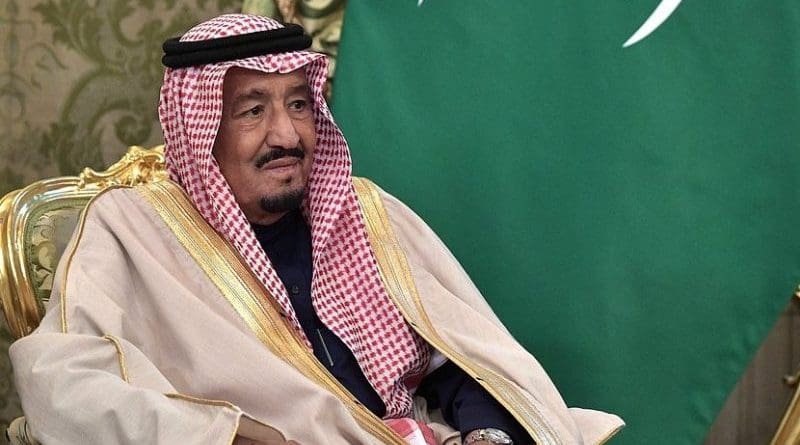Royally Political Purge In Riyadh – Analysis
By Observer Research Foundation
By Kabir Taneja*
The recent turn of events in Saudi Arabia have been nothing short of a Hollywood thriller with Family, King, Princes, neighbouring countries and missile attacks all thrown into the mix for good measure
Eighty-year-old King Salman Abdulaziz Al Saud, in a political liquidation, rounded up 11 princes of the royal House of Saud, along with various Ministers and officials in what was marketed as an “anti-corruption” initiative in which prominent royal members were arrested and “jailed” in Riyadh’s notoriously luxurious Ritz-Carlton hotel. This included globally influential names such as billionaire investor Alwaleed Bin Talaal, who has close ties with various American industrialists and owns five per cent of social media site Twitter.
Over the span of 72 hrs starting November 3, a purge was underway, ballistic missiles were fired towards the Saudi-capital Riyadh from Yemen, Lebanon’s Prime Minister Saad Hariri resigned (on television) from his post from Saudi Arabia, accusing Iran of medaling in internal Arab affairs before disappearing from public eye, Yemen’s incumbent President Abdrabbuh Mansur Hadi, who also took up refuge there months ago, was reported to be under ‘house arrest’ (Saudis released pictures of a meeting with Hadi in attempts to refute such rumors). Two other princes were reportedly killed, one in a curiously timed helicopter crash near Yemen and another, rumored to have been shot while resisting an ‘attempted arrest’. This tragedy-ridden Shakespearean-theatre makes King Salman the conductor of a never seen before ‘tri-purge’, orchestrating political changes in his own country, Lebanon and Yemen simultaneously.
However, most analysts agree that the recent events are King Salman’s strategy to clear way for the 32-years-old heir-apparent, Prince Mohammed Bin Salman. It is believed King Salman has already started the process of aiding Prince Salman to the throne, his son from his third spouse, transferring power by the end of 2018. The start of the said process was highlighted by social reforms with Saudi Arabia agreeing to allow women to drive, a long-standing issue of contention. It has also allowed women to attend sports events at stadium. These changes come on the back of waiting for the accession of a young King, who will preside over a very-young and globally well-connected Saudi population on the cusp of a post-oil economic and social order, and a corrupt royal system against which sentiments had been latently bubbling for a long time.
This would require relaxed norms and a better global positioning to attract foreign investments, foregoing its rigid and suffocating rules that curtail freedom and basic human rights for its citizens, specifically women. The announcement of Saudi Aramco, the country’s national oil company, which at a point few years ago was worth more than India’s GDP, going partially public to raise money came as a surprise to many. However, it implanted the narrative of slow but drastic changes taking place in the kingdom, both politically and socially. This is highlighted by examples such as the steadily increasing domestic oil consumption in the country, thanks to domestic population growth. A robust and rich domestic economy is critical for Riyadh, both to keep a check on its young population and till a certain degree secure the House of Saud’s own future.
Saudi concerns in regional West Asian dynamics have heightened over the past few months with Iranian influence growing at a rapid pace. The question around Syria and future of the said conflict has now been pretty much decided, with President Bashar al-Assad expected to stay, with the help of the Russians and Iranians. Iranian Islamic Revolutionary Guard Corps (IRGC) and Hezbollah-backed militias are today already prevailing interest groups in large parts of Syria, with Tehran also wielding significant power in Iraqi and Lebanese politics along with running a indirect war in Yemen. The recent failed Kurdish referendum also saw Iran’s influence shine through over contentions between Baghdad and Erbil regarding the control of Kirkuk after its liberation from ISIS, while the Saudi — Qatar diplomatic standoff pushed Doha to increase its engagements with Iran as well.
Despite collusion of regional interests, the exact reasons and future outcomes of this purge remain unclear. The narrative of an anti-corruption drive remains strong, but also begs the question whether this is the start of greater transparency in Saudi Arabian affairs or greater turmoil. Riyadh is banking on US President Donald Trump to back it to the hilt, specifically against Iran, on the pretext of which its regional overtures could be marketed as legitimate political tinkering to an often-naive new White House. How this purge plays out in reality, is anyone’s guess at the moment.
This article originally appeared in The Pioneer.

